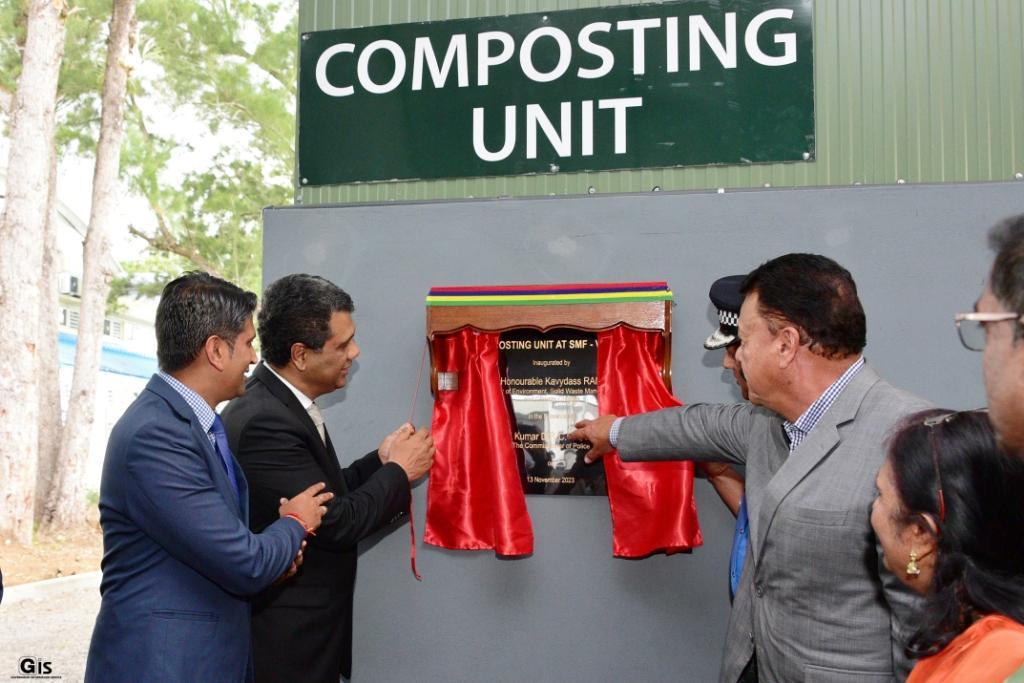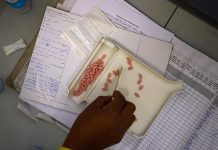Africa-Press – Mauritius. A Composting Unit aimed at converting green wastes into compost in line with the principle of circular economy, was inaugurated, yesterday, in the presence of the Minister of Environment, Solid Waste Management and Climate Change, Mr Kavydass Ramano, at the Special Mobile Force (SMF) in Vacoas.
The Parliamentary Private Secretaries, Mr Serge Gilbert Bablee and Mr Kenny Soobeersingh Dhunoo; the Chief Commissioner of Police, Mr Anil Kumar Dip; and the Principal Research Scientist of the Food and Agricultural Research and Extension Institute, Mr Mohammad Alfaz Atawoo; were also present on the occasion.
In his address, Minister Ramano underscored that the project is in line with Government’s vision of a cleaner and greener Mauritius and its commitment to achieving the United Nations Sustainable Development Goals.
It is fully in line with our circular economy strategy and our efforts to divert waste from landfills, he said. The Composting Unit, he indicated, will take green waste generated in the Gymkhana area and the Sodnac Wellness Park and is expected to divert around 200 tonnes of green waste from landfill annually.
He further stated that solid waste management is one of the major environmental challenges that Mauritius is facing mainly as a result of unsustainable production and consumption patterns over the last few decades.
He pointed out that more than 10 million tonnes of solid waste have already been landfilled at the Mare Chicose adding that around 96% of the waste produced is currently landfilled.
Some 500,000 tonnes of solid waste were landfilled at Mare Chicose in 2022 and the number is expected to increase to around 650,000 tonnes in 2030, he observed.
Minister Ramano emphasised that the traditional method of disposing waste in landfill is no longer sustainable and safe as waste is becoming more and more toxic.
The Ministry, he stated, has therefore taken several initiatives to adopt a more sustainable solid waste management system for the country, in line with the circular economy concept and with the target of diverting 70% of waste from landfill by 2030. A new Solid Waste Strategy and Action Plan with the financial support of the Agence Française de Développement has thus been devised, he added.
Speaking about the Plan, he said that it includes the setting up and running waste collection centres; the setting up and operating an integrated waste treatment facility comprising a regional composting plant and sorting units; composting units at Bras d’Eau and Vacoas to compost green waste from parks and gardens; a feasibility study for the setting up of an end-of-life vehicle recycling facility and a biogas plant for the anaerobic digestion of organic waste; and the preparation of two regulations on extended producer responsibility for the management of electrical and electronic waste and post-consumer beverage containers.
Moreover, he dwelt on the need for a sound legislative framework while indicating that the Ministry, with the help of the United Nations Development Programme, has developed the Waste Management and Resource Recovery Act to provide strategic direction and guidance on sustainable solid and hazardous waste management practices.
This law, he added, will soon be enacted and will help the Ministry to adopt an integrated and sustainable approach to the sound management of wastes. Minister Ramano appealed to the population to develop a new mindset and to change their habits as regards disposal of wastes.
The Ministry, he mentioned, is working on an awareness-raising campaign and the distribution of coloured and correctly labelled bins to households to enable proper segregation of wastes.
To date, around 31,000 compost bins have been distributed to households across the island. Mr Atawoo, for his part, underlined that the Unit will help address the issue of waste disposal and contribute in reducing greenhouse gas emissions in the face of climate change.
He stressed on the importance of maximising reliance on renewable and natural resources for generating compost while adding that the Russia-Ukraine war has caused an acute shortage of fertilisers on the global market.
The FAREI, he indicated, is committed to explore more sustainable composting technology and optimise the use of natural resources so as to encourage local production of good quality compost in line with international standards. To this end, he added that FAREI has come up with the Compost Subsidy Scheme that offers 100% subsidy provided on locally produced compost.
For More News And Analysis About Mauritius Follow Africa-Press







